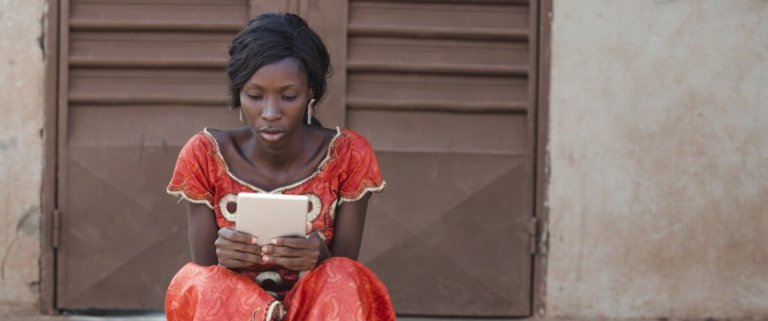
Globally, 750 million youth and adults do not know how to read and write and 250 million children are failing to acquire basic literacy skills. Literacy is central to education and plays an important role in development and peace.
In response to this global educational challenge, our team based at the University of British Columbia developed the open multilingual literacy portal Global Storybooks.
This portal hosts custom sites with multilingual open-licensed books for over 40 countries and regions on five continents. Our vision is to help democratise global flows of information and resources, to facilitate language learning – including Indigenous languages – and to promote literacy.
One of the United Nations’ Sustainable Development Goals is to achieve quality education globally by the year 2030. High illiteracy rates among children are partly due to a lack of appropriate reading materials in languages familiar to children. Research has shown that children learn to read best in their family’s home language, which also establishes a strong foundation for learning any additional languages.
We believe the Global Storybooks project has the potential to promote quality education, literacy and multilingualism worldwide. Open educational resources (OER) have much potential to address the lack of reading materials in poorly resourced communities, facilitate language learning and reduce inequities between communities and nations.
From 150+ African languages
The origins of this Global Storybooks digital project are found in the African Storybook initiative, which digitises and makes freely available under an open license over 1,000 original stories in over 150 African languages, as well as English, French and Portuguese.
The South African organisation Saide began developing this site in 2013, with funding from the UK charity Comic Relief and research support from UBC scholars.
Grounded in a shared vision of global literacy and open technology, our UBC team collaborated on the development of Storybooks Canada, with seed funding from UBC Language Sciences. Launched in 2018, Storybooks Canada was the first of our Global Storybooks sites. It has a growing team, with a range of funders, including Education without Borders, the Peter Wall Institute and Mitacs. It is built on a curated selection of 40 openly licensed stories from the African Storybook that have been repurposed for a Canadian and global audience.
The stories have been translated into 19 of the most widely spoken languages in Canada, with studio-quality audio versions. An additional 10 languages are still in the process of being translated or recorded. Many of the translations and recordings, which are ongoing, are done by international graduate student volunteers with an interest in literacy and language learning.
Indigenous languages and stories
As news of Storybooks Canada has spread internationally, many scholars, educators and community agencies have invited us to collaborate on the development of localised sites for their communities, based on the Global Storybooks platform.
Features and benefits
This platform has been specifically designed to support the development of mother tongue literacy, bilingualism, and multilingualism with the following features:
- Single-click access: The stories can be reached in a single click.
- User-friendly layout: Easy to navigate and can support self-directed learning.
- Audio and print: Promotes reading by linking sounds and symbols.
- Mobile-first design: Websites can be easily viewed on any device, including cell phones, tablets and desktop computers.
- Parallel texts: Users can toggle between different translations of the same story. The more familiar language helps to scaffold understanding of the less-familiar language.
- Downloading: Stories can be downloaded in different PDF layouts, including monolingual or bilingual and regular or wordless/imageless versions. Users can also download in a landscape format (for reading on screens) or a booklet format (for printing).
New sites can draw on the existing database of stories and multimedia in multiple languages, and new translations are developed as needed. At present, translations have been made in more than 50 new languages. For example, the Storybooks Jamaica site features translations of the 40 stories into Jamaican Creole and the stories on Storybooks Haiti are available in Haitian Creole.
Ongoing research
The Global Storybooks project generates many questions for educational research: How well do stories travel from one region of the world to another? To what extent can sites like Storybooks Canada promote home and school connections for immigrant and refugee students? Does the use of dual language storybooks promote language awareness in linguistically diverse classrooms?
Team member and UBC PhD candidate Michelle Gilman is investigating connections between Storybooks Canada and the BC curriculum. PhD student Asma Afreen is addressing cultural identity in the translation of English language stories from the African Storybook into Bengali for Storybooks Canada and Storybooks Bangladesh. Her knowledge of Bangladeshi cultural practices and social relationships helps inform the translation process.
As we celebrate the International Day of Education on Jan 24, 2020, we believe that the global community needs to heed the advice of the UN Secretary General to do far more to promote equitable education internationally. The ongoing development of Global Storybooks is one response to this urgent call.
This story was co-authored by Liam Doherty, a PhD candidate at UBC in language and literacy education.
By Bonny Norton, Professor, Department of Language & Literacy Education, University of British Columbia and Espen Stranger-Johannessen, Associate professor, Faculty of Education, Inland Norway University of Applied Sciences
This article is republished from The Conversation under a Creative Commons license. Read the original article.
Liked this? Then you’ll love…
Why schools’ reading lists should include more diverse books
PISA 2018 results show that youth reading skills must improve worldwide







